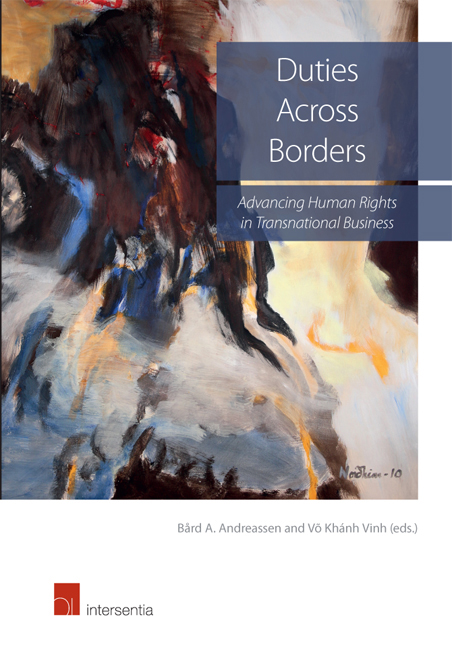Book contents
- Frontmatter
- Preface
- Contents
- List of Authors
- List of Figures and Tables
- Introduction. Business’ Duties Across Borders: The New Human Rights Frontier
- Part I. Conceptual Developments
- Part II Contextual Issues
- Part III Sites Of Regulation
- Chapter 10 Human Rights and Business. An Assessment of the Responsibility of the State in Vietnam
- Chapter 11 Investment Treaties and Human Rights. Reflections from Mining in Latin America
- Chapter 12 Beyond State Duty and Corporate Responsibility. Human Rights in Industrial Zones in Vietnam
- Chapter 13 The Application of the UN ‘Protect, Respect and Remedy’ Framework to State-Owned Enterprises. The Case of the State Oil Company SOCAR in Azerbaijan
Chapter 12 - Beyond State Duty and Corporate Responsibility. Human Rights in Industrial Zones in Vietnam
from Part III - Sites Of Regulation
Published online by Cambridge University Press: 21 September 2018
- Frontmatter
- Preface
- Contents
- List of Authors
- List of Figures and Tables
- Introduction. Business’ Duties Across Borders: The New Human Rights Frontier
- Part I. Conceptual Developments
- Part II Contextual Issues
- Part III Sites Of Regulation
- Chapter 10 Human Rights and Business. An Assessment of the Responsibility of the State in Vietnam
- Chapter 11 Investment Treaties and Human Rights. Reflections from Mining in Latin America
- Chapter 12 Beyond State Duty and Corporate Responsibility. Human Rights in Industrial Zones in Vietnam
- Chapter 13 The Application of the UN ‘Protect, Respect and Remedy’ Framework to State-Owned Enterprises. The Case of the State Oil Company SOCAR in Azerbaijan
Summary
INTRODUCTION
Industrial and export processing zones are considered magnets for direct foreign investment and attractive for foreign enterprises and subsidiaries of transnational corporations in Vietnam. Despite fuelling domestic economic growth by industrial development and job creation, industrial zones’ performance has caused a series of actual and potential human rights violations within workplaces and in surrounding communities. Working conditions in industrial zones in Vietnam revealed a breadth of human rights abuses such as low wages, excessive overtime, temporary contracts, deteriorated working conditions, and environmental pollution which affected not only workers and their families but also people living in the surrounding areas.
The 2011 United Nations Guiding Principles on Business and Human Rights (the Guiding Principles) provide a practical guidance to identify and address human rights impacts, emphasising the state duty to protect against human rights abuses, the corporate responsibility to respect human rights, and the need for greater access to victims to effective remedy. Despite numerous endorsements, the Guiding Principles face some scepticism regarding their practicability, which depends on the context of specific countries, and an inherent voluntarism on part of the enterprises’ adherence to the principles. Surya Deva argues that ‘[e] ven if the Guiding Principles are implemented by states and embraced by the business community, they might not make a significant difference in preventing and remedying corporate human rights abuses, especially in situations where there are governance gaps or companies are reluctant to be guided by the Guiding Principles’.
In fact, in developing countries whose aim is to attract foreign investment for development, governments are often unwilling to intervene in companies’ activities for fear of impairing their competitiveness. Weak states lacking the requisite governance capacity are also less able to control effectively the activities of foreign enterprises. Likewise, in authoritarian or undemocratic states where rampant corruption is common place, enterprises often lobby ruling elites to ignore their wrongdoings and disrupt the legal enforcement of human rights. At the same time, for enterprises, for the sake of profit maximisation and in the absence of a legally binding regulatory framework, corporate social responsibility (CSR) is often regarded as an added cost. This in turn undermines enterprises’ propensity to voluntarily incorporate CSR.
- Type
- Chapter
- Information
- Duties Across BordersAdvancing Human Rights in Transnational Business, pp. 279 - 300Publisher: IntersentiaPrint publication year: 2016

